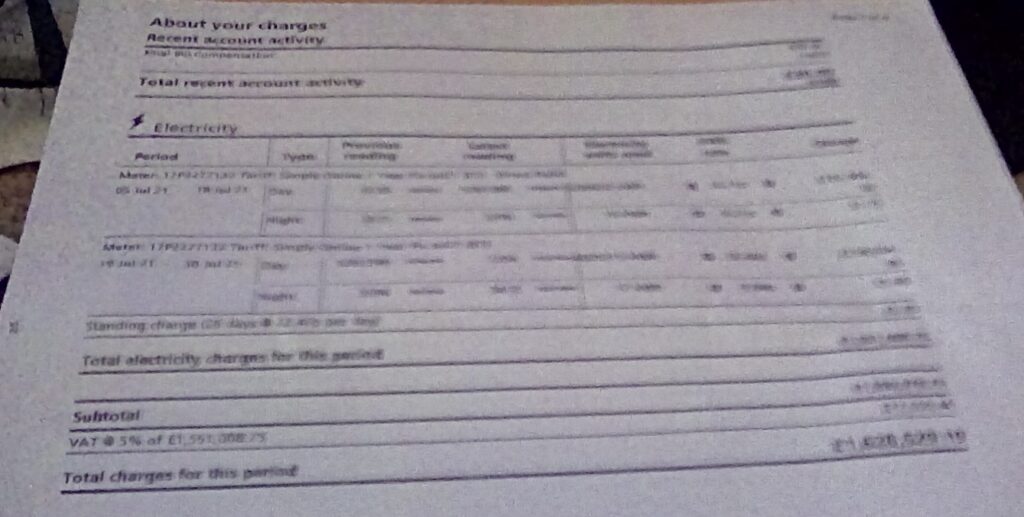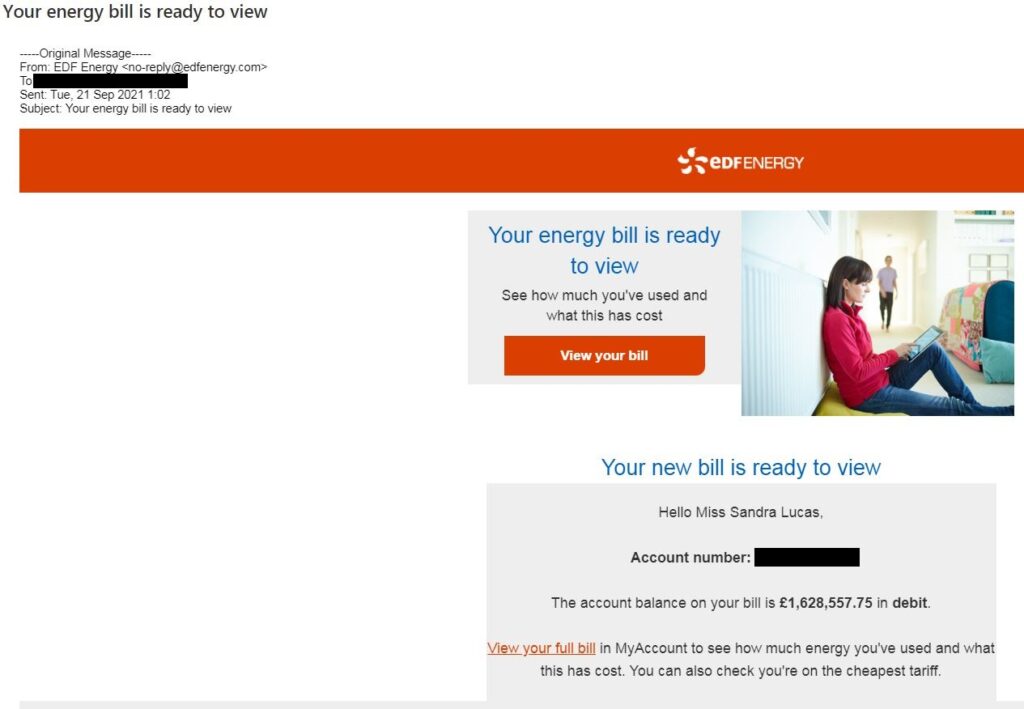
The chaos of the energy markets has landed on the doormat of one unfortunate pensioner in Greater Manchester. A little over a week ago, Sandra Lucas received an electricity bill for £1.6m from her former provider, EDF Energy.
Having left the energy company in July this year, after she says her direct debit was about to double from £60 to £120 a month, she suddenly received a bill for £1,628,557.75 on 21 September, both by letter and over email, as electricity and gas prices surged in the UK.
The energy crunch started affecting customers in September, as suppliers went bust, and nearly two million are being moved to new tariffs.




Photos by Sandra Lucas
When Lucas complained about the huge bill, she received a response from a customer service adviser at the company a week after it was sent, seen by the New Statesman, saying they would aim to look into the problem by 22 October – a month after she received the bill.
When she replied she wasn’t prepared to wait for four weeks, she received no response.
An EDF Energy spokesperson says the bill was incorrect due to an automation error and that “we quickly resolved this error the very next day when we sent Ms Lucas a corrected bill”, which she had not received at the time of writing.
“Now I know gas prices have rocketed but to tell a disabled pensioner they owe £1.6m defies belief,” Lucas, 67, who suffers from a lung condition, told the New Statesman. “At first, I was sick to my stomach, but the anger took over when I realised their total disregard for what they had done.
“What bothers me the most was whoever drew up that last bill didn’t think there was anything wrong with a residential bill of £1.6m, and even gave me only ten working days to pay it – you can see clearly on the bill they wanted full payment by 4 October. It hurts that they are unwilling to acknowledge the seriousness of what they have done. This could have caused suicidal thoughts in someone else.”
In fact, before she received the bill, Lucas was actually owed £40 by EDF Energy after ending her contract with the firm. “The cheeky so-and-sos didn’t even deduct the £40 they owe me from the £1.6m – now that’s bad customer service for you.”
An EDF spokesperson says she has been refunded the £40, adding:
“We pride ourselves on delivering a great level of customer service and on this occasion, we have fallen short and are sorry for any distress caused. In recognition of the short-fall in customer service on this occasion, we will be offering a gesture of goodwill and our customer services team will also be in touch with Ms Lucas.”
The energy sector has been in chaos since global gas shortages started pushing prices up. Tariff hikes are causing stress and confusion among consumers with nine energy suppliers going bust since 1 September, affecting nearly 1.73 million customers in that month alone. Consumers who are moved to a new supplier after their previous one goes out of business face paying almost £30 a month more, according to research by Citizens Advice.
Inaccurate bills make up more than 40 per cent of the problems cited by energy customers who call the Citizens Advice consumer helpline, straining people’s finances and causing unnecessary stress and uncertainty, according to the latest figures from January-March 2021.
“Providing an accurate energy bill is the most basic aspect of customer service that a supplier can offer and yet many are failing to do this,” said Clare Moriarty, chief executive of Citizens Advice.
“When customers with billing errors are unable to contact their supplier for help, it can cause immense stress. These problems are even worse for those who are already worried about money.”
Millions of households and businesses across the country will be hit by at least a £139 rise in energy bills as October begins, with the energy cap – which limits how much providers can charge – increasing from 1 October. This could mean an escalation of fuel poverty as another half a million households are forced to decide whether to eat or heat their homes. UK bills are likely to rise again: the energy cap is due to increase by £280 – on top of the £139 hike – next April.
A spokesperson for the energy regulator Ofgem said: “We’re doing all we can to make sure consumers, especially people in vulnerable circumstances, don’t pay more than is absolutely necessary this winter and the energy price cap Ofgem sets is doing just that – making sure only legitimate costs to supply energy feed into the rates customers pay.
“Around 15 million households are covered. Today, the latest price cap level as announced in August, of £1,277 for average dual fuel customers will apply. It is going up to reflect the rise we saw in energy costs earlier in the year.
“Higher energy costs are never welcome news to anyone and the timing and size of this increase will be particularly difficult for many families still struggling with the impact of the pandemic. Anyone struggling to pay their energy bills should get in touch with their supplier to access the help that’s available.
“We put tough rules in place to ensure suppliers treat customers who are struggling with bills fairly, and welcome their commitment to reach out to those who most need help this winter.”
[see also: The week Britain ran out]






